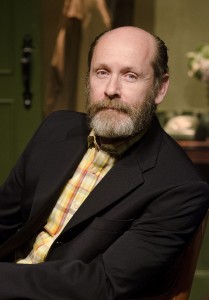This continues a series of interviews where Epic artistic director Kevin Broccoli interviews other ADs in the area to create a more in-depth conversation about theater in Rhode Island. This month’s interview is with 2nd Story’s artistic director Ed Shea.
 Kevin Broccoli: 2nd Story produces theater year-round. Is it difficult not being able to take a break when you’re creating a steady stream of programming?
Kevin Broccoli: 2nd Story produces theater year-round. Is it difficult not being able to take a break when you’re creating a steady stream of programming?Ed Shea: I didn’t build the place to take a break. We run a non-profit with a for-profit mindset. And we’re proud of that. There’s an old Smith-Barney ad that John Housemen did. The slogan was, “We make money the old fashioned way … we earn it.” I’m thinking of putting that on our letterhead.
KB: You’re one of the few theaters in the state with two separate performance spaces. When you’re looking at plays, what determines where the play will wind up? Is it something technical like cast size, or is there something about certain plays that lead you to producing them in a more intimate setting?
ES: It’s a gut call. I think there have been a few plays produced up or down that could have gone either way. For instance, Silvia was produced in the smaller space. It would have been a great UpStage play. But I think the intimacy of the smaller DownStage allowed us to refresh the play. Upstairs, it would have been a play about a dog. Downstairs, it was a play about a marriage.
KB: Often times, theaters don’t get credit for revitalizing the communities they’re in. Warren looks so different now versus when 2nd Story first started there. Do you feel a sense of pride in helping to create some of that revitalization?
ES: I don’t see us as being responsible for a revitalization, rather as emblematic of a transformation already in progress.
KB: When you look at what 2nd Story was when you first started it and what it is today, what changes seem the most striking to you? Are there specific accomplishments or achievements that you think of as being indicative of the theater’s overall success?
ES: I would have to say that owning two buildings is something I never would have envisioned. And now, those real estate holdings are a big part of our identity, a testament to our stability and longevity. Having rented spaces in the past (and having lost as many as I’ve rented), it feels good to be free of real estate unknowns. I can’t imagine being at the mercy of some greedy landlord at this stage of the game.
KB: I ask all the artistic directors this: Do you have any regrets?
ES: Nope. Not a one.
KB: After a few years of staging proscenium shows, you’re back to in-the-round. What about performing shows in the round inspires you as a director and performer?
ES: The proscenium was a fun experiment. A lark. And I enjoyed the opportunity to explore and master the style. But the round is authentically who we are. The proscenium was a kind of Dorothy journey: Oz was fun, but, oh man! There’s no place like home.
KB: What do you hope people take away from working on a 2nd Story production?
ES: A feeling of accomplishment at having done one’s very best, and having been supported in that quest by the theater as a whole: production and administration. The joy of having participated in something of which one can be unequivocally proud. Most importantly, to come away having learned something. Having been challenged. Having grown. As an artist. As a craftsman. As a human being.
KB: I’ve seen and heard you talk about how meditation has influenced you as an artist (an actor and director) but I was wondering if it’s influenced the way you handle the business side of running a theater as well?
ES: When Suzuki Roshi, author of Zen Mind, Beginner’s Mind, was asked to sum up Buddhism in a simple and concise way, he said, “Everything changes.” We are currently in a period of enormous change for non-profit theater. Thriving, even surviving, requires a willingness to accept, invite, even initiate, change. To anticipate the impending change, then get out in front of it. To be the wind, not the leaf.
KB: What other artists, even non-theater artists, inspire you?
ES: Picasso. He spent a lifetime reinventing himself. I love his quote, “Every act of creation is first an act of destruction.” I apply that philosophy often, from changing the line-up mid-season, to going from the round to proscenium (and back), to ripping out a kitchen and building a studio theater. Destroy, then create.
KB: You’ve been onstage more over the past few seasons than you were during the early years of 2nd Story. What’s it been like becoming one of the theater’s regular actors? Can you talk about what being onstage means to you personally?
ES: It’s my touchstone. It’s the thing I do best. It’s what I was meant to do. I had to learn to be a director. But I was born an actor. Directing is a skill. Acting is a talent. When I am onstage, I am totally “present.” There is a total, complete and effortless alignment of body, mind and spirit. And I feel very fortunate, blessed, to have been given that gift. My acting talent has been my lifelong loyal friend. My eternal companion.
KB: Where do you see 2nd Story in the next five years? How would you like to see it evolve?
ES: I have a couple of irons in the fire. Good stuff. Actually, great stuff. But the PT Barnum in me isn’t ready to disclose them yet.

